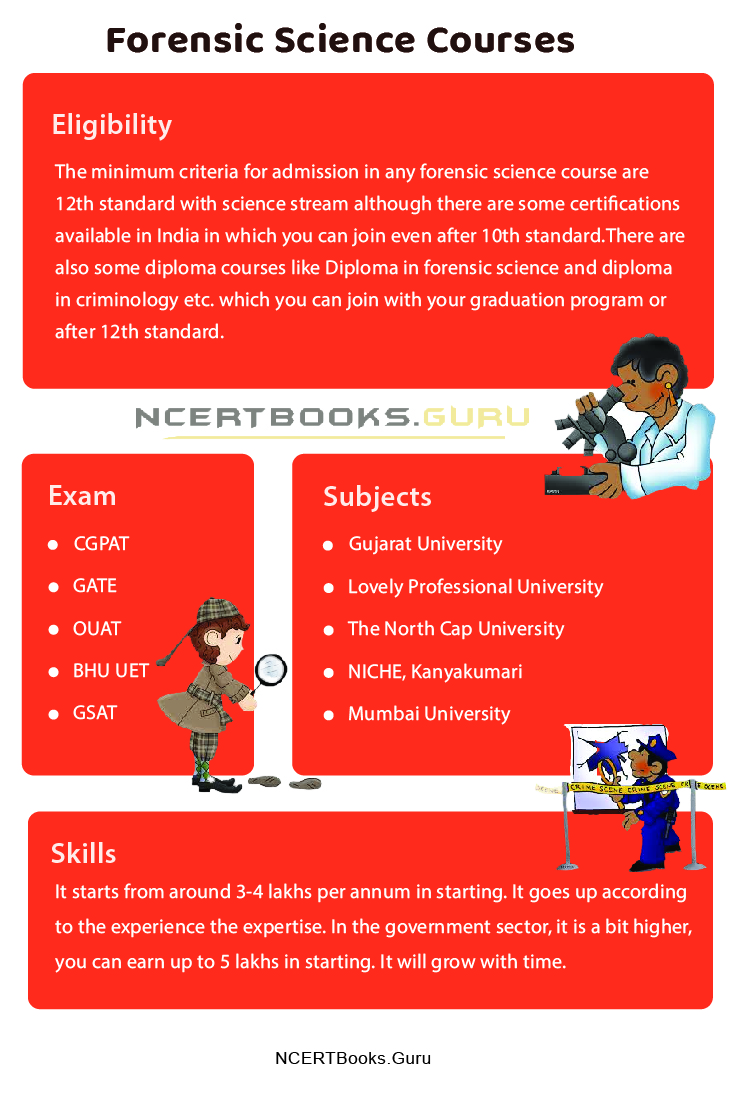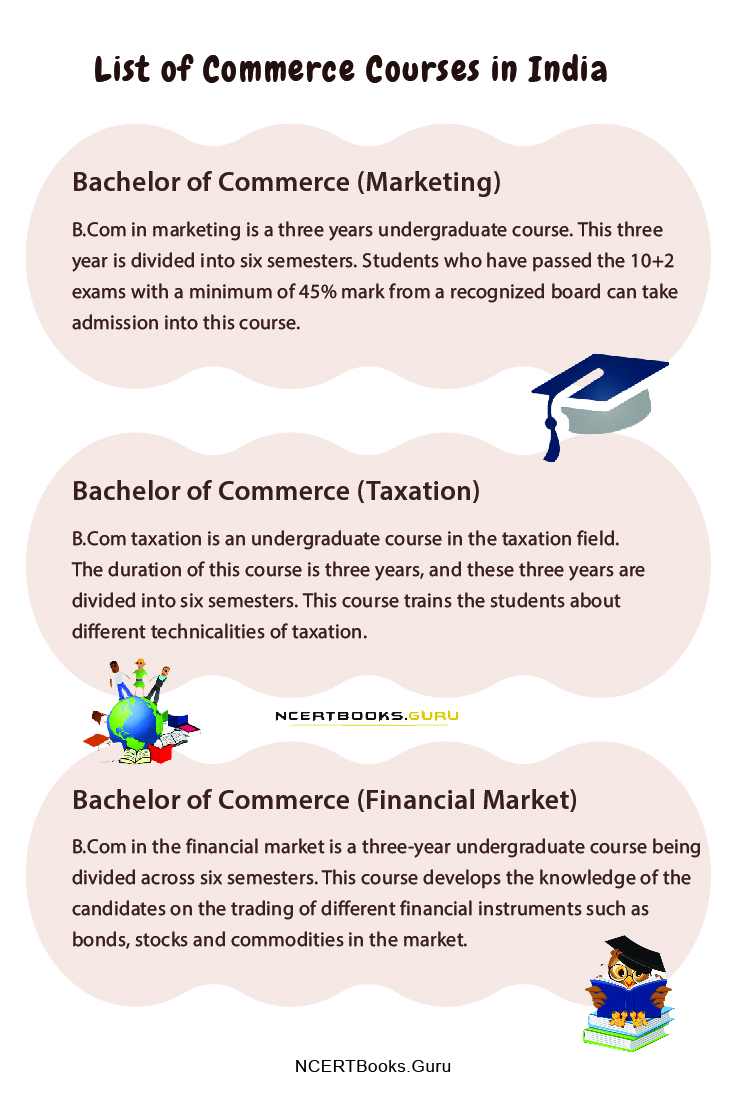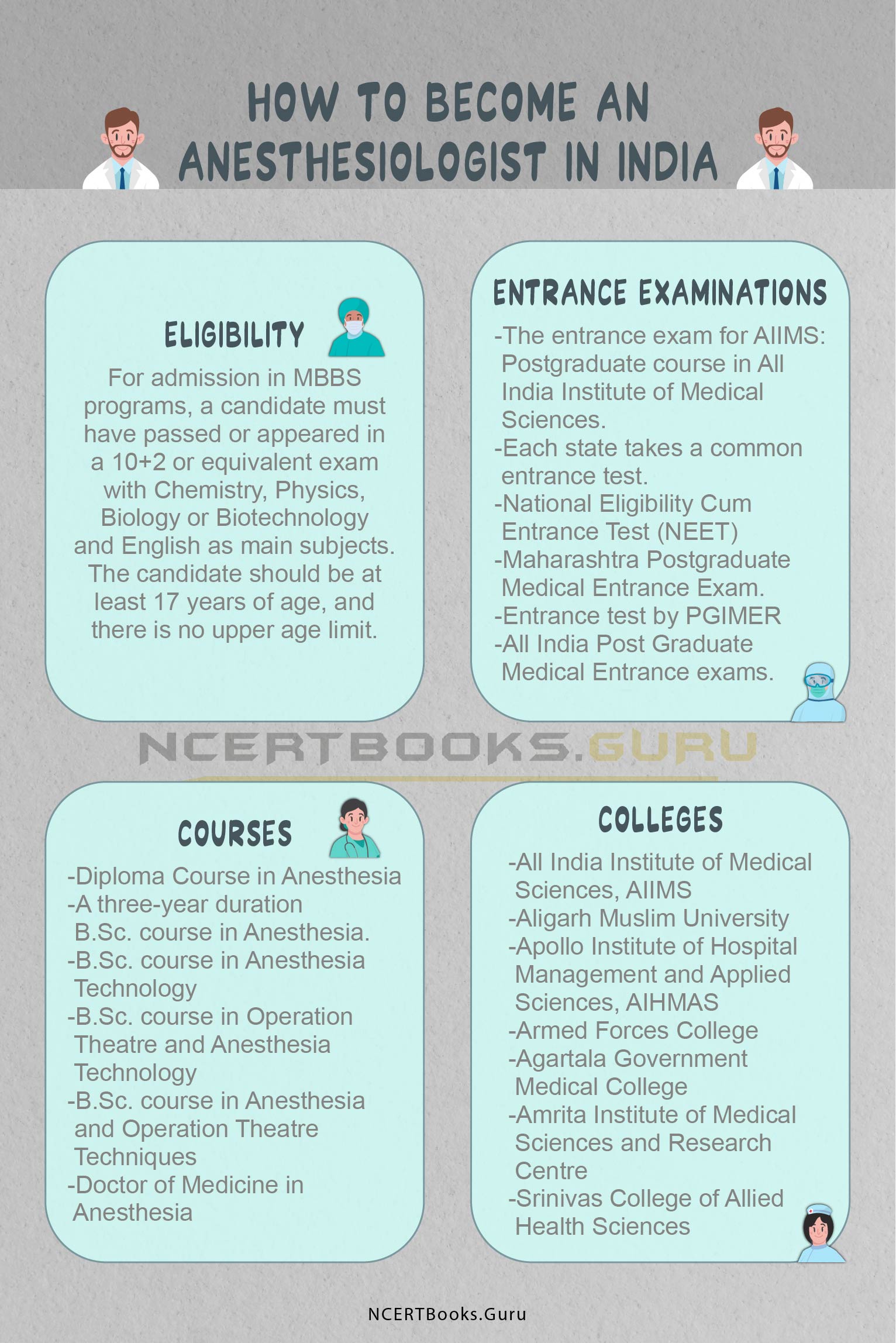Forensic Science is a branch of science that deals with the investigation of Law and justice. The aspirant who has qualified 12th standard in Physics, Chemistry, Biology, Mathematics, and Psychology can go for the certification, diploma, bachelor, Master Degree in Forensic Science.
The aspirant who has an interest in solving mysteries, problem-solving skills, and analytical thinking can opt for forensic science courses like Forensic scientist, Private Investigator, Forensic Serologist, Forensic Architect, Engineer, Cyber Crime, Crime Laboratory Analyst, Forensic Consultant, and many more.
Check out all the other Course Details stream-wise and category-wise.
- Forensic Science Courses Eligibility
- Forensic Science Courses Fee
- Admission Procedure for Forensic Science Course
- Entrance Exam for Forensic Science Courses
- Forensic Science Course Colleges in India
- Forensic Science Courses Syllabus
- Career in Forensic Science Courses
- Forensic Science Course Scope
- Subject to be studied during Forensic Science Courses
- Salary Offered to Forensic Science Experts
- Is Forensic Science a good career opportunity In India?
- What is the role of a Forensic Scientist?
- What is the Prerequisite for joining a Forensic Science Course?
- What is the Duration of the Forensic Science Course?
- Is there any Entrance Exam for admission to Forensic Science Course?
Forensic Science Courses Eligibility
The minimum criteria for admission in any forensic science course are 12th standard with science stream although there are some certifications available in India in which you can join even after 10th standard. There are also some diploma courses like Diploma in forensic science and diploma in criminology etc. which you can join with your graduation program or after 12th standard.
Forensic Science Courses Eligibility Criteria
You can pursue education in Forensic science through certification, diploma, degree and master’s, Ph.D., and Research. Here is the list of Forensic Science Courses:
| Name of Forensic Science Courses | Eligibility Criteria | Duration of Course |
| Undergraduate Program | ||
| Diploma Course in Forensic Science | 12th in Science Stream | 3 months to 1 year |
| Diploma in Cyber Crime and Law | 12th Science | Up to 1 years |
| Bachelor in Forensic Science, Accident Forensics | 12th in Science Stream | 3 years |
| Bachelor in Criminal Justice, Criminology | 12th Science Stream | 3 years |
| Bachelor in Forensic Investigation | 12th Science | 3 years |
| B. Com in Forensic Accounting | 12th | 3 years |
| Forensic Biotechnology and DNA Fingerprinting certification and specialization | 12th Science | Up to 1 years |
| Forensic Psychology and Criminal Profiling certification | 12th any stream | Up to 1 years |
| B.Tech- M.Tech Integrated Computer Science and Engineering with specialization in Cyber Security | 12th in Science Entrance Test | 5 year |
| Post Graduate Program In Forensic Science | ||
| MSc in Forensic Science | Bachelor’s degree in Science or equivalent qualification | 2 years |
| Post-Graduation in Criminology and Forensic Science | Graduation in Science or Equivalent Qualification | 2years |
| M.Sc in Forensic Psychology | Graduation and Entrance Test of General psychology | 2years |
| M.Sc in Forensic Anthropology | Graduation | 2 years |
| Master of in Forensic Science | Graduation | 2 years |
| M.Sc in Digital Forensics and Information Security | Graduation in Science, Forensic Science, and Entrance Test | 2 years |
| MA in Criminology with specialization in forensic Psychology | Graduation and Entrance Test | 2 years |
| M.Sc in Forensic Biotechnology | Bachelor’s degree in any science stream | 2 years |
| M.Sc in Multimedia Forensics | Bachelor’s degree in science, B.Tech in CS/IT, Electronic and communication | 2 years |
| M.Sc in Forensic Dentistry | Bachelor of Dental Surgery | 2 years |
| Ph.D. in Forensic Sciences | PG in Forensics and Entrance Test | – |
Forensic Science Courses Fee
When we want to join a forensic science course different colleges have different fee structures. Let us look into the fee structure for different courses. And also in this course, we have both government and private colleges.
Under Graduate:
- Government College Fee: 5.64 K – 4.50 Lakhs
- Private College Fee: 88.50 K – 6.81 Lakhs
Post Graduate:
- Government College Fee: 4.40 K – 2.00 Lakhs
- Private College Fee: 14.00 K – 4.00 Lakhs
Doctoral:
- Private College Fee: 3.00 Lakhs – 7.20 Lakhs
Diploma:
- Government College Fee: 7.83 K
- Private College Fee: 1.35 Lakhs
Admission Procedure for Forensic Science Course
You have to qualify 12th standard in the science stream for admission to forensic science courses. There are some universities that conduct entrance tests for admission in UG as well as PG programs.
Entrance Exam for Forensic Science Courses
The candidate who wants to join Forensic Science Courses has to check the eligibility criteria of different institutions thoroughly. For undergraduate courses, candidates have to be qualified to their 12th standard in the science stream which is the basic criteria for most forensic science courses. The candidate has a good score in the English language and is proficient in some exams like IELTS and TOEFL. IN some of the intuitions the aspirant has to appear in the entrance exam. Here is a list of some entrance tests in which a candidate has to appear for admission in Forensic Science Courses.
- CGPAT
- GATE
- OUAT
- BHU UET
- NEST
- GSAT
Some universities give preference to candidates who qualify for these examinations. Most universities have their own entrance test for admission to the Forensic Science courses.
Forensic Science Course Colleges in India
In India, there are many colleges that offer Forensic Sciences Courses. Here is a list of colleges you can opt for your study.
| LNJN National Forensic Sciences University Delhi Campus (GOI) |
| International Forensic Science Institute, Pune |
| Gujarat University |
| Banaras Hindu University (BHU) |
| Lovely Professional University |
| Amity University |
| SGT, Gurgaon |
| The North Cap University |
| MGU Kottayam |
| NICHE, Kanyakumari |
| SIMATS, Chennai |
| Mumbai University |
| KJC, Bangalore |
| KMC, Manipal |
Forensic Science Courses Syllabus
Here we are going to discuss the syllabus that you will learn in the forensic science course. These subjects are taught across various colleges. Along with theoretical subjects, they are also familiarized with practical aspects.
- Foreign Language
- Benzedrine Test
- Criminal Behaviour
- Introduction to Criminology
- Blood analysis
- Introduction to Forensic Science
- Psychological Factors
- Blood analysis
- Introduction to Chemistry
- DNA Fingerprinting
- Benzedrine Test
- Introduction to Chemistry
- Personal Identification
- X-ray diffraction techniques
- Typewriting and Handwriting
- Blood Pattern Analysis
- Crime scene investigation
- Analysis of Biological fluids
- Physical evidence in forensic evidence
- Introduction to toxicology
- Simple microscope
- Compound microscope
- Classification of poisons, effect on the human body
- Recent advances
- Arson and explosion investigation
- Compound microscope
- Forensic anthropology
- Physical evidence in forensic evidence
- Examination of documents
- Biological instrumental methods
- DNA isolation
- Physical instrumental methods
- Forensic serology
- Dissertation
- Recent advances
- Forensic ballistics
Do Refer: List Of B.Sc Forensic Science Courses
Career in Forensic Science Courses
After pursuing forensic science courses you can join the government and private sector. Here is the list of departments you will join after completing the Forensic Science course.
Career in the Government Sector:
| Police Department |
| Crime Branches |
| CBI/ CID/ IB |
| Forensic Science Laboratories |
| Banks |
| Control Bureau |
| Narcotics Department, Investigation Bureaus. |
| Universities |
| Hospitals |
Career in Private Sector:
| Forensic Laboratories |
| Detective Agencies |
| Bank and Insurance companies |
| Universities |
| Hospitals |
| Laws Firms etc |
Must Refer: How to Become a Forensic Scientist in India
Forensic Science Course Scope
After graduation and a master’s in Forensic Science, you can join the government as well as the private sector as a forensic Scientist, Forensic Engineering, Crime Reporter, Forensic Expert, Forensic Serologist, Crime Scene Investigator, Researcher, Legal Counselor, document and handwriting, forensic accounting, etc.
Posts/ Job Profile in Forensic Science:
| Post Name |
| Forensic Expert & Scientist |
| Forensic Investigator |
| Document and Handwriting Exert |
| Forensic Accountant and Fraud Examiner |
| Forensic Analyst |
| Detective and Investigating officer |
| Professor and Faculty |
| Forensic Engineer and Crime Reporter |
| Forensic odontologist And Psychologist |
| Forensic Medical Examiner and Technician. |
Subject to be studied during Forensic Science Courses
Forensic science courses include subjects like Forensic Biology, Forensic Physics, Forensic psychology, Forensic Toxicology, Analytical Chemistry, Instrumental Chemistry, DNA Isolation and Profiling, Cyber and Forensic Law, Crime and Investigation Techniques.

Salary Offered to Forensic Science Experts
The salary offered to forensic science experts is different for different posts. It starts from around 3-4 lakhs per annum in starting. It goes up according to the experience the expertise. In the government sector, it is a bit higher, you can earn up to 5 lakhs in starting. It will grow with time.
Frequently Ask Questions on Forensic Science Course Details
1. Is Forensic Science a good career opportunity In India?
Yes, Forensic science is a good career opportunity in India, according to the BPRD, the number of crimes is increasing in India by 5.9% every year. Many cases are pending in Courts due to a lack of forensic experts. So there is a huge opportunity in Forensic Science in India.
2. What is the role of a Forensic Scientist?
The role of a forensic scientist is to help solve criminal cases, frauds, and other types of cases through scientific methods so that the court can make the right decision in solving the case.
3. What is the Prerequisite for joining a Forensic Science Course?
You can join any forensic course after passing the 12th standard in Science Stream. You can also join any certification or diploma courses with your graduation. If you are a psychology student then you can also join a forensic psychology course.
4. What is the Duration of the Forensic Science Course?
There are 3 years of bachelor’s as well as 1-2 year certification courses available in forensic science after the 12th. After graduation, you can also opt for MA and MSc in forensic science for 2 years. There are also some 5 years of integrated courses in Forensic Science.
5. Is there any Entrance Exam for admission to Forensic Science Course?
There are many universities that conduct Entrance exams for admission in a Forensic Science course. Some universities demand qualifying GSAT, OUAT, NEST, CGPAT, BHU UET, etc for admission in Forensic Science.










